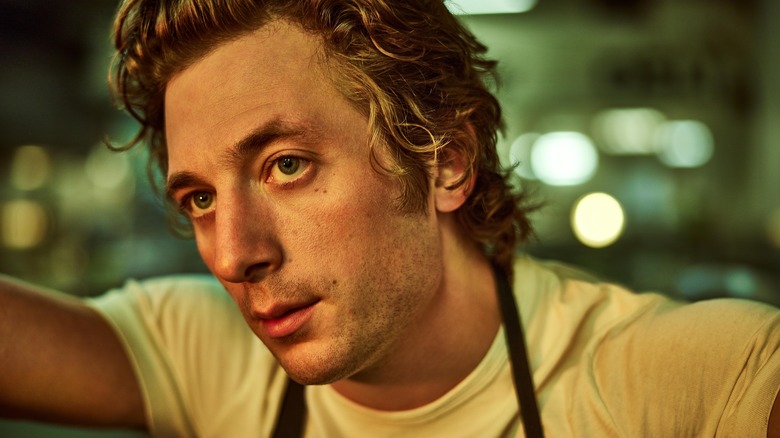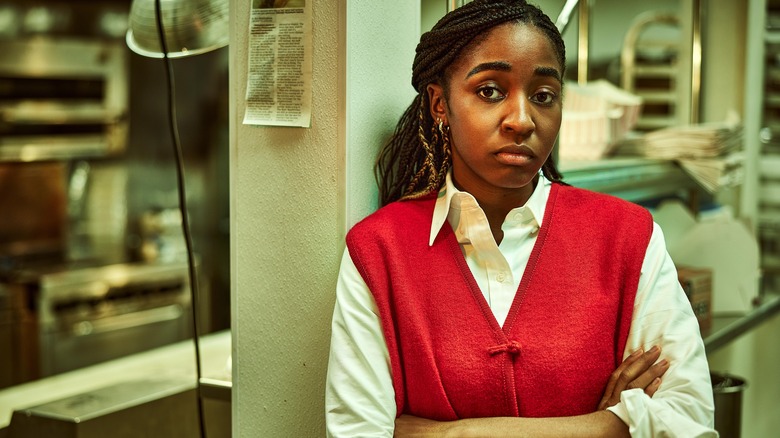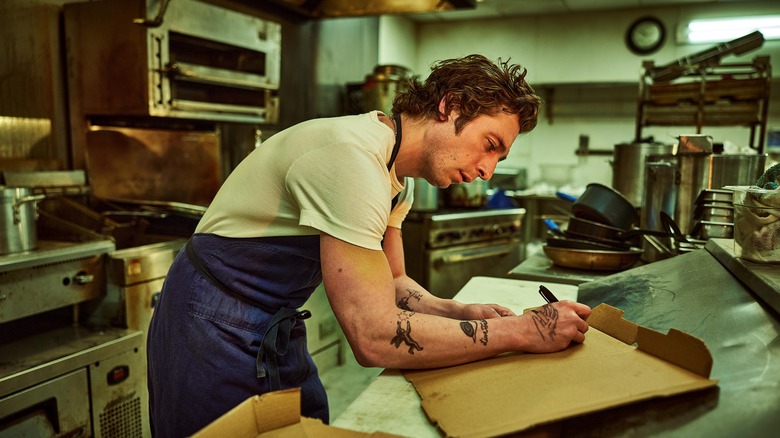The Bear Season 2 Shows The Real Ins And Outs Of Restaurant Competition
This article contains spoilers for Season 2 of "The Bear."
Season 2 of FX's critical hit "The Bear" has finally dropped, and it continues to brandish show's secret weapon beyond just, y'know, being really, really good. True, protagonists Carmy Berzatto (played by Jeremy Allen White, who won a Golden Globe for his turn as a chef taking over his deceased brother's failing restaurant) and Sydney (played by Ayo Edebiri, his sous chef struggling with her own culinary identity) feel real and lived-in, and the writing never has a down moment. And while White's carefully-rationed monologues are unquestionably mesmerizing, the real key to the way "The Bear" connects with audiences is that it's quite possibly the most realistic depiction of restaurant work ever put on film. And one of the ways its sophomore season accomplishes that is by showing what restaurant competition really is — and just as importantly, what it isn't.
It's rare for a show to really nail what constitutes competition in the restaurant industry. Too often, it's seen by outsiders as an intensely constantly cutthroat business. While it certainly can be that way at times — McDonald's is obviously going to compete with Burger King — it's important to remember that collaboration is just as crucial as competition when it comes to food service. After all, a Chinese restaurant isn't really competing with a breakfast place next door; they serve entirely different needs, and are just as likely to have a symbiotic relationship as a parasitic one.
Restaurants collaborate just as often as they compete
Enter "The Bear." When we last left Carmy at the end of Season 1, he was planning to open a new restaurant with hundreds of thousands of dollars he discovered his brother had squirreled away in his old restaurant's cans of stored tomato sauce. Season 2 thus focuses both on the attempt to save a failing business and the chance to craft an entirely new one with (quite literally) found money. A huge part of that — particularly in Episode 3, "Sundae" — is building an entirely new menu, and that's where the collaborative aspect of the show's take on restaurant culture really comes alive, as newly-minted Chef de Cuisine Sydney goes on a tour of local restaurants for inspiration.
Sampling another spot's food for new ideas seems obvious when you're developing a new menu. (See: Sydney, after ordering a breakfast sandwich and a side of hashbrowns at a restaurant, decides to combine the two into one.) But Syd's restaurant tour doesn't just include eating the food, it also encompasses getting advice from other chefs. An Episode 3 montage depicts Sydney talking to multiple restaurateurs and a butcher for ideas for Carmy's new restaurant, getting a tour of how these businesses operate while taking more notes than a stenographer on fast forward. It brings home an important, real-life point fairly common and understood in the food industry: In the culinary world, collaboration isn't an anomaly.
Chefs help each other, but there's one thing you don't do
It's true that chefs in real life will absolutely help each other out, give each other ideas, and foster a community within a collective ecosystem. Often, all a chef needs to do is demonstrate their love of food, and what the public might think would be zealously-guarded "secrets" become an open book. Restaurants rise and fall so often that chefs can't afford to view the industry as a "Highlander"-specific ethos (i.e., a "there can be only one" situation); you help people out when you can, because tomorrow you might need them to help you.
It's worth noting that there's one area where restaurant competition really is cutthroat — specifically, the act of poaching — and it's one "The Bear" also touches upon. Though the industry is often the Wild West, there's a code you're not supposed to break, and one of its key tenets is not to steal another spot's employees. At one point, desperate for new hires, Sydney tries to do just that in an alley — only to be excoriated by another chef. There are some things you just don't do.
But for the most part, the restaurant industry is far more about collaboration than about cutthroat backstabbing. Chefs typically view each other as peers — a culinary "game respects game" that transcends cuisine types and even experience levels. Restaurants help each other far more than people realize, and it's just another way "The Bear" gets it right.


